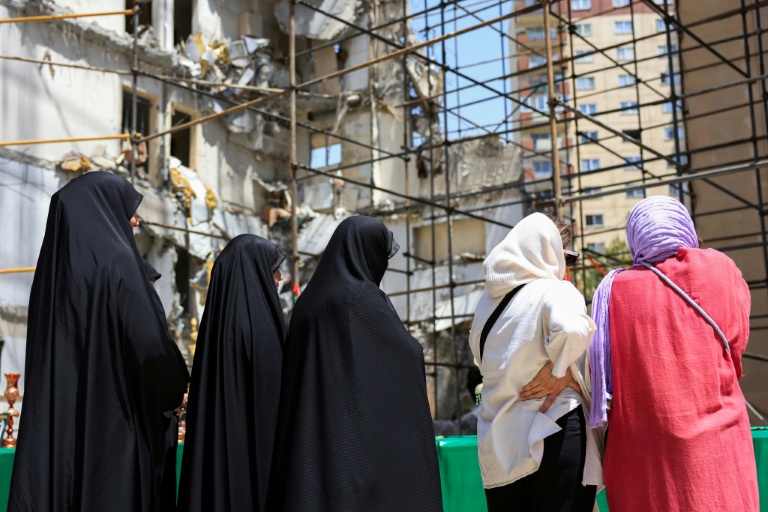Ongoing Uncertainty After the Ceasefire
The ceasefire that ended Iran’s 12-day conflict with Israel has held for nearly a month without any incidents, yet many Iranians remain uneasy. The uncertainty lingers as fears of another confrontation persist. Peyman, a 57-year-old resident of Shiraz in southern Iran, one of the cities heavily impacted during the Israeli bombing campaign, expressed his doubts about the sustainability of the ceasefire.
The Israeli offensive targeted key nuclear facilities and military sites, resulting in the deaths of top commanders and nuclear scientists, along with hundreds of other individuals. The attacks caused significant damage to residential areas as well. This unprecedented strike marked the fiercest fighting between the two longtime adversaries, culminating in a ceasefire announced on June 24.
However, Israel has made it clear that it could resume hostilities if Iran attempts to rebuild its nuclear facilities or engages in actions deemed threatening, such as pursuing an atomic bomb—something Tehran has consistently denied. In response, Iran has vowed to retaliate harshly if attacked again.
Nuclear diplomacy with the United States, which briefly joined the conflict with strikes on key Iranian nuclear sites, has stalled, adding to the sense of uncertainty regarding what lies ahead. Hamid, a 54-year-old government employee who only provided his first name, voiced his fears: “I am scared the war would start again. It will lead to the death of more innocent people and the destruction of the country’s infrastructure.”
During the war, Israel struck major Iranian cities, including the capital Tehran, targeting military sites, government buildings, and the state television headquarters. According to authorities, over 1,000 people were killed in Iran, while retaliatory missile and drone attacks in Israel resulted in 29 fatalities.
Fear of Repeating Past Trauma
Many residents fled Tehran, seeking refuge in other parts of the country, even though few regions remained untouched by the bombings and smoke-filled skies. Nearly a month later, a series of fires that broke out across Iran, including one at a major oil facility, sparked speculation, but officials quickly dismissed any acts of sabotage.
Golandam Babaei, a 78-year-old housewife from Kermanshah province in western Iran, shared her fear: “This war really frightened me.” She lived through the Iran-Iraq war of the 1980s, a painful memory for many of her generation. “I kept telling myself, please God, do not let the past repeat itself,” she said.
The conflict with Israel, although shorter and fought mainly with air strikes and missiles rather than ground forces, revived grim memories of the Iran-Iraq war. That war, triggered by an Iraqi invasion in 1980, killed an estimated 500,000 people on both sides. It involved chemical warfare and prolonged front-line bombardments, leaving deep scars on Iranians during the early years of the Islamic republic formed after the 1979 revolution.
For decades, Iran managed to keep conflicts away from its territory. However, the 12-day war with Israel has left some feeling a profound sense of vulnerability. “I kept thinking I don’t want to flee again; we have nowhere to go. I cannot run to the mountains like the past,” said Babaei.
A Changing Military Landscape
Ali Khanzadi, a 62-year-old war veteran, noted a significant change compared to the 1980s when “we didn’t have any advanced military equipment” to fight the Iraqis. Khanzadi, who was wounded in battle in 1983, pointed out that the conflict with Israel had a more sinister dimension.
Unlike the past, modern military technology now allows for remote attacks that can kill a child in their sleep using a drone. In the face of these threats, Iranian authorities have emphasized national unity. Supreme Leader Ayatollah Ali Khamenei has claimed the offensive was aimed at toppling the Islamic republic’s clerical system and urged diplomats and military officials to proceed with “care and precision” as the country cautiously moves forward.
Tehran has stated its openness to resuming nuclear diplomacy with the United States, which the war had disrupted. However, officials have raised concerns about renewed attacks and demanded unspecified guarantees from the U.S. to restart negotiations.
Ordinary Iranians seem to share fears that the conflict could erupt again. Hamid expressed hope that this would not happen, while Babaei prayed for peace and safety in their homes.







